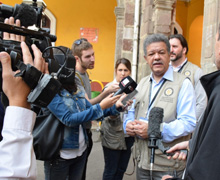news
Except for a Few Small Incidents That Were Resolved Leonel Fernández Says the Bolivia Referendum Was Held Peacefully
February 25, 2016
The head of the Organization of American States’ (OAS’s) electoral observer mission and former president of the Dominican Republic Dr. Leonel Fernández highlighted on Sunday afternoon that, in general, the voting in Bolivia had taken place peacefully, save a few isolated issues that were resolved by the electoral authorities.
Fernández also highlighted the huge turnout of voters to the polls, a fact he deemed positive. “In
general terms, what we’ve seen is that the process has occurred in relative peace, in calm,” he highlighted.
Fernández reported that some disturbances were registered in Santa Cruz (East), where the proceedings did not arrive, affecting five thousand voters, some of whom reacted by burning ballots.
Nonetheless, he highlighted that the electoral authorities, acting in line with the country’s laws, ordered new elections to be
held in that location on March 6.
Fernández further noted that problems also occurred in other cases when the proceedings did not arrive on time, thus delaying the start of the voting. In those cases—he said—the electoral authorities opted to extend the voting hours until 8 p.m., by which time no voters remained who had not exercised their suffrage.
“As a general rule, the process was carried out normally, peacefully, with high turnout among
voters,” reiterated the head of the OAS observer mission, after deeming the problems that arose in some communities to be “isolated.”
“They are isolated incidents to which solutions have been sought, scheduling new elections in one case and extending the schedule in another,” noted Fernández.
In terms of voter turnout, he said that by 1 p.m., 52% of voters had cast their ballots, according to reports
received from the delegates deployed by the OAS in 172 electoral precincts at the national level.
“What I can establish as a fact, based on the reports from our delegates, is that by one in the afternoon, 52% of voters had cast their votes; this is quite a remarkable figure,” said Fernández, after reporting that on Monday, around noon, he would head a press conference in which he would deliver a more exhaustive report on the general development of the
process.
More than 6.5 million Bolivians were called to the polls on Sunday to decide whether to accept or reject a Constitutional reform to increase from two to three the number of allowed consecutive presidential terms, which, upon approval, would make it possible for the current president Evo Morales to run in the 2019 elections for a fourth term until 2025.







